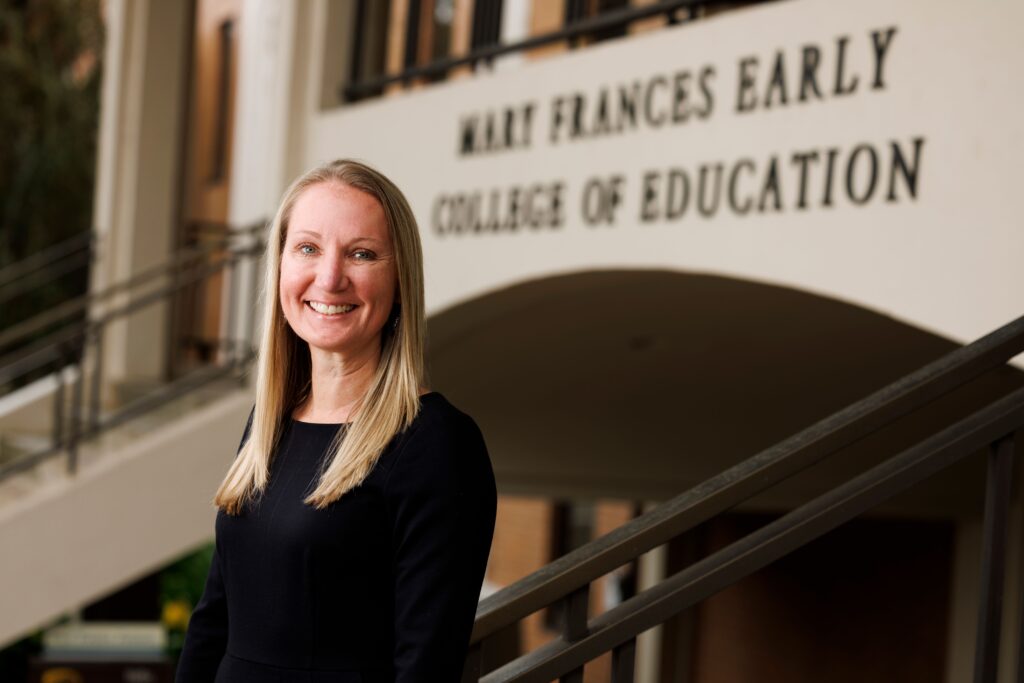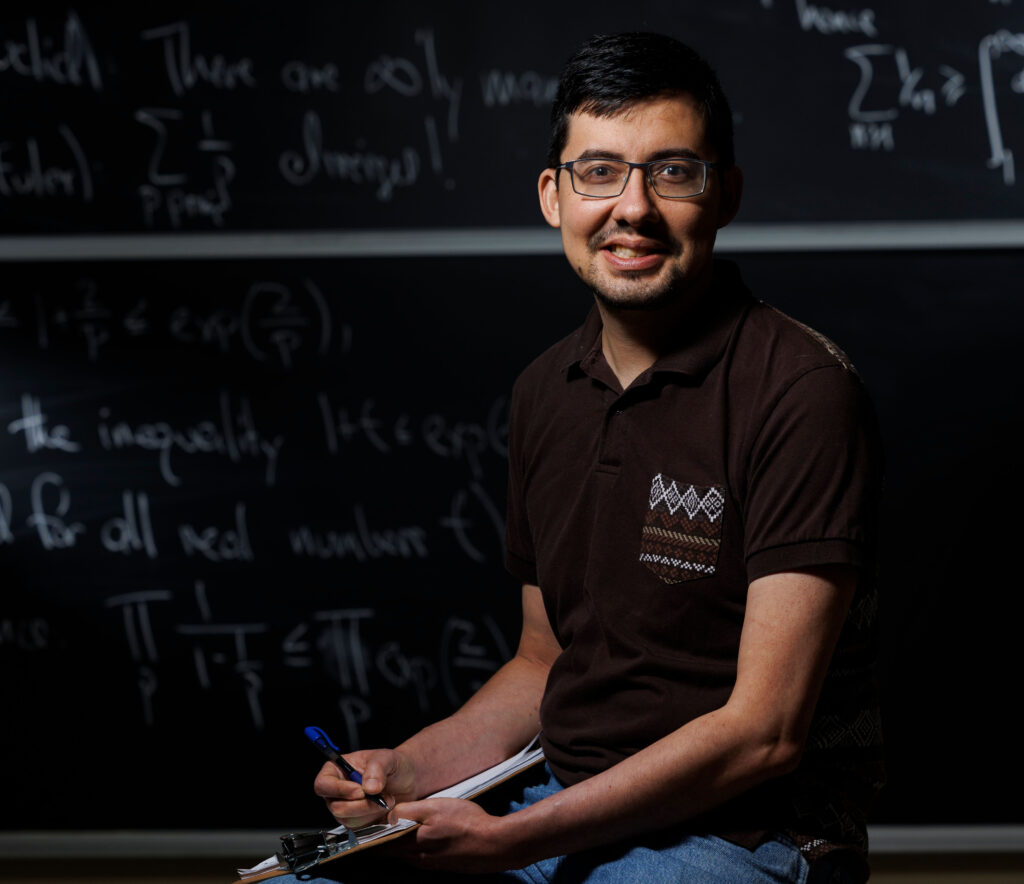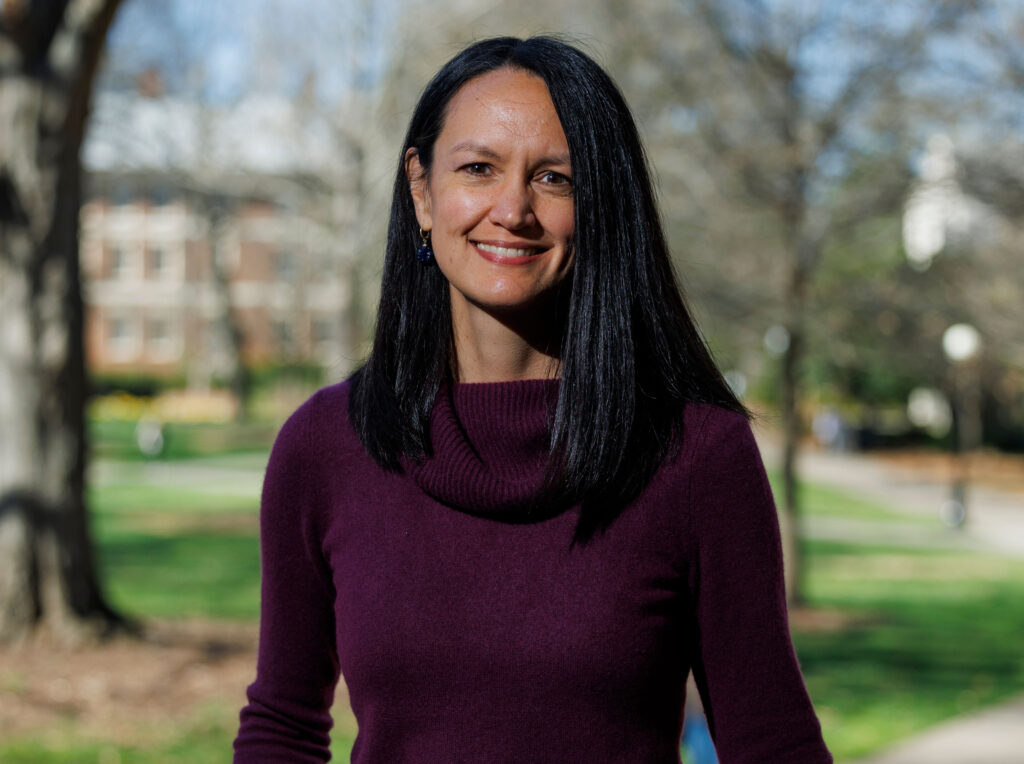Three UGA faculty members received a Russell Award for Excellence in Undergraduate Teaching in 2022. Russell Awards recognize outstanding teaching by faculty early in their academic careers. The Richard B. Russell Foundation in Atlanta supports the program, and award recipients receive $10,000.

Jennifer Brown is an associate professor in the Department of Communication Sciences and Special Education in the Mary Frances Early College of Education. (Photo by Andrew Davis Tucker/UGA)
Jennifer Brown
Associate Professor
Department of Communication Sciences and Special Education
Mary Frances Early College of Education
Jennifer Brown wants her students to know what they’re learning, focus on how they’re learning and remember why they’re learning. That ensures they’ll understand the impact their learning has on others.
“I empower students to engage in the learning process,” she said.
Her teaching is based on interconnected shared experience; problem solving and critical thinking; and motivating, inclusive and respectful learning environments. Her instruction incorporates interactive lecturing, active learning, problem-based learning and backward mapping.
“Dr. Brown goes above and beyond as a professor to relate the information to real-life situations,” one former student wrote. “Dr. Brown is teaching us not only information, but also how to implement that information into problems and circumstances that make us more readily prepared for our future endeavors.”
That blend of instruction has earned Brown several awards at the college level, including the Ocie T. Dekle Excellence in Teaching Award and the Ira E. Aaron Award for Teaching Excellence and Collegiality; five grants; and three editorial positions at scholarly journals.
Brown also contributes at the departmental level, working on new course development, revising and preparing instructional methods for established courses and contributing to program-wide curriculum adaptations.
One of the more distinctive programs Brown created is a culturally sustaining service-learning and instructional-research partnership with Downtown Academy, a non-profit private school serving inner-city children since 2013. According to Brown, this partnership is designed to integrate service-learning, instruction, research and service in a unique way to provide meaningful applied learning experiences for UGA students, provide extended learning opportunities for children in the Athens community, build connections with community and educational organizations, and extend student mentored applied research. Participating UGA students implement literacy-enriching after-school activities, administer assessments and collaborate with teachers on language, and literacy class activities.
“Dr. Brown’s work has provided groups of students with outstanding classroom and experiential learning opportunities; mentored individual students from a range of backgrounds to succeed in school and in the university setting; and developed and sustained an intricate, masterful and creative blend of teaching with research and service,” one colleague wrote.
—Krista Richmond

Paul Pollack is a professor in the Department of Mathematics in the Franklin College of Arts and Sciences. (Photo by Andrew Davis Tucker/UGA)
Paul Pollack
Professor
Department of Mathematics
Franklin College of Arts and Sciences
Paul Pollack hopes his students come away understanding the beauty and power of mathematics.
“From this point of view, teaching is less about imparting knowledge and more about guided discovery, where one sets the stage for students to have their own transcendent encounters with mathematics,” he said.
Pollack does this through what he calls active lecturing, which centers on student involvement, such as working a problem collectively in class.
“Indeed, one of the most exciting aspects of teaching is the opportunity to continually develop and refine one’s technique through fruitful conversations and collaborations with colleagues as well as students,” he said. “I am grateful for the chances I have had to pursue these opportunities at UGA, and I hope very much to continue to do so for years to come.”
Pollack makes sure his students know the subject matter may be difficult and that there are resources available to help them sort through any confusion. In particular, he schedules his office hours strategically around his students’ availability, often treating them as interactive problem-solving sessions. That attention to students has led to recognitions such as the 2018 Sandy Beaver Excellence in Teaching Award.
“Dr. Pollack exemplified for me what I’m looking for in a professor—especially in a math professor,” one student wrote. “In instructing us with a lot of enthusiasm and care, he cultivated our knowledge of the subject in the best way possible.”
Additionally, Pollack is one of the principal organizers of the UGA High School Math Tournament and has served as a faculty mentor for a week-long UGA MathCamp for three summers. He taught brief courses in the Philippines in 2013 and the Dominican Republic in 2017. Pollack continues to work with the Ross Program, an international program that provides college-level immersive learning in mathematics for high school students. He ran the Ross/Asia Mathematics Program in 2018 and then taught an advanced course at the program in 2019 and virtual advanced courses in 2020 and 2021.
“Only a truly gifted and conscientious teacher could contribute to teaching and mentoring in such a variety of interconnected ways, and this is what makes Professor Pollack unique,” one colleague wrote.
—Krista Richmond

Julie Stanton is an associate professor in the Department of Cellular Biology in the Franklin College of Arts and Sciences. (Photo by Andrew Davis Tucker/UGA)
Julie Stanton
Associate Professor
Departments of Cellular Biology
Franklin College of Arts and Sciences
Julie Stanton strives to do three things in her teaching: help her biology students become better learners, base her teaching in science and have meaningful interactions with her students.
“My teaching mentor offered this advice: ‘Teach from who you are as a person.’ I have learned so much from outstanding teachers around me, but I have also learned to be myself in the classroom. I am a person who loves learning, values science and has a deep desire to connect with other people. That is also who I am as a teacher,” she said.
Redesigned weekly 75-minute breakout sessions are just one example of the way Stanton has helped students and colleagues. She created, tested, revised and retested 16 lessons in the style of process-oriented guided inquiry learning (POGIL), an evidence-based approach to collaborative problem-solving. In these lessons, students work in small groups on material from primary literature to learn current methods, analyze real data and design experiments, developing important collaboration skills. Stanton has mentored 10 colleagues and nearly a dozen graduate teaching assistants to teach their own POGIL-style breakout sessions in SCALE-UP classrooms.
Mentoring is another way Stanton serves her students, including them in all aspects of research. Stanton has mentored 21 UGA undergraduate researchers in her lab, 13 of whom are co-authors on published or submitted papers with Stanton.
“Dr. Stanton’s success as a professor not only stemmed from her overarching compassion and concern for her students, but also from her ability to teach complex biological processes,” one former student wrote. “Dr. Stanton complemented her lectures with active learning engagement and group-based breakout sessions. After every exam, students were also challenged to self-reflect on their study methods to identify strategies that had worked well and areas for improvement. With all of these efforts, Dr. Stanton went above and beyond as a professor to cultivate a safe and challenging learning environment for her students.”
That dedication has led to several honors, including the Regents’ Scholarship of Teaching and Learning Award and the Sandy Beaver Excellence in Undergraduate Teaching Award. She is a Fellow of both the Lilly Teaching Program and the UGA Teaching Academy.
—Krista Richmond







